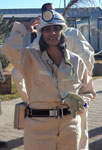
Subscribe & Follow
#AfricaMonth
Jobs
- Brand and Marketing Manager Johannesburg
- Global Senior Talent Delivery Researcher Cape town
- CRM and Lifecycle Manager Cape Town
- Paid Social Campaign Manager (Junior–Mid Level) Cape Town
- Digital Content Creator Cape Town
- Sales Representative - Digital Print Johannesburg
- Junior Account Executive Cape Town
- Lecturer: Language Conversational Sign Language Cape Town
- Digital Marketing and Content Creator Specialist Johannesburg
- Content Marketing Manager Cape Town
Women in underground mining: beyond policy

According to Dr Moreshnee Govender, programme manager in Occupational Health and Safety at Wits University's Centre for Sustainability in Mining and Industry (CSMI), women face some particular dangers when working underground, many of which are not openly discussed with a view to a sustainable solution.
Among the more chilling of these was the rape and murder of a woman mineworker last year whilst working underground. Less dramatic but equally important issues relate to the suitability of technology (including protective equipment and underground facilities), gender attitudes, including work organisation and design which impact on the health and safety of these workers.
"There is a need for an open forum that includes not just management, the unions and government, but also women mine workers themselves along with academics and researchers," said Dr Govender, "to reflect on our collective experience in the last decade since women have been working underground. This sort of forum will help us to ask the right questions and plan the best way forward towards sustainable solutions within our context."
Complex process
Since the law changed and the Mining Charter committed to employ more women, their share of employment in this sector has grown from less than 3% to over 10% overall. Under pressure from high unemployment, many have opted for those underground jobs previously performed only by men.
"This is a complex process," she said. "It's not as simple as just saying that the law now allows women to work underground and policy promotes this opportunity - so implementation will follow accordingly. We have a responsibility to do more. We need to go beyond policy, and reflect on both the direct and indirect consequences for women in this unique workplace, and use this evidence to inform current and future practice."
She likens the process to a sort of 'social experiment' - the results of which now need some careful evaluation.
"Women have been working underground for ten years or so; we should by now have some statistics relating to occupational injuries and diseases, for example, and some record of what the issues for concern are," said Dr Govender.
"We know that underground mining is a dangerous environment, not just from the accidents but from the diseases that workers might sustain. We still need to be asking the question: Have we adequately addressed the issue of safety of women miners in the underground mine work environment? "We also need to reflect on the interventions we've made to date, and what impacts they have had. Sadly, I'm finding that not much is said about it in the public domain."
Dr Govender's background as a medical doctor is only part of the skill set that she brings to bear on this field. Her focus on taking the issue beyond policy toward practical and sustainable solutions stems from identifying design problems in a hospital environment, from which she entered the multi-disciplinary world of ergonomics in industry.
Mechanisation - ripe for discussion
After completing a Diploma in Occupational Safety and Health in Practice at the Swedish Institute for Working Life, she became inspired by the prospect of finding solutions through a fuller appreciation of technology and design re-engineering. So she followed this up with Masters degree in Ergonomics, also in Sweden.
Looking ahead at issues increasingly likely to be tackled by the underground mining sector, she highlighted mechanisation as ripe for discussion. "Mechanised mining is a big issue currently," she said. "You would think that this could lead to the involvement of more women in mining, as it suggests less manually demanding work. It would be a good area for an open forum to engage upon."
"We have an excellent opportunity to be at the forefront not only in the research and development of appropriate technologies for women that support them in their pioneering new roles in the challenging underground setting, but in publicising our experience as a country in truly addressing equity in the workplace," she said. "This would not only benefit women but men as well and will be a valuable experience to be shared with the rest of the continent, and even other parts of the world."
But the starting point is yet to be reached, where women are given a voice among the other industry stakeholders, in a forum where experiences can be articulated and constructive directions can be forged to be relevant at the coal face. Dr Govender is working to make this a reality.








